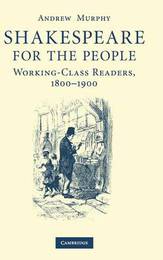
|
Shakespeare for the People: Working Class Readers, 1800-1900
Hardback
Main Details
| Title |
Shakespeare for the People: Working Class Readers, 1800-1900
|
| Authors and Contributors |
By (author) Andrew Murphy
|
| Physical Properties |
| Format:Hardback | | Pages:256 | | Dimensions(mm): Height 229,Width 152 |
|
| Category/Genre | Literary studies - c 1800 to c 1900 |
|---|
| ISBN/Barcode |
9780521861779
|
| Classifications | Dewey:822.33 |
|---|
| Audience | | Tertiary Education (US: College) | |
|---|
|
Publishing Details |
| Publisher |
Cambridge University Press
|
| Imprint |
Cambridge University Press
|
| Publication Date |
13 March 2008 |
| Publication Country |
United Kingdom
|
Description
Beginning by mapping out an overview of the expansion of elementary education in Britain across the nineteenth century, Andrew Murphy explores the manner in which Shakespeare acquired a working-class readership. He traces developments in publishing which meant that editions of Shakespeare became ever cheaper as the century progressed. Drawing on more than a hundred published and manuscript autobiographical texts, the book examines the experiences of a wide range of working-class readers. Particular attention is focused on a set of radical readers for whom Shakespeare's work had a special political resonance. Murphy explores the reasons why the playwright's working-class readership began to fall away from the turn of the century, noting the competition he faced from professional sports, the cinema, radio and television. The book concludes by asking whether it matters that, in our own time, Shakespeare no longer commands a general popular audience.
Author Biography
Andrew Murphy is Professor of English at the University of St Andrews.
Reviews'... this absorbing, enlightening book highlights a time ... informative and enthralling account ...' The Stage '... engaging and humane new study. Drawing on about a hundred autobiographies, both published and in manuscript, Shakespeare for the People offers an absorbing mosaic of the role played by the national poet in the consciousness of working-class readers (as opposed to theatre-goers) in nineteenth-century England and Wales. ... he writes illuminatingly about the history of publishing and book-selling ...His book pays poignant abut quite unsentimental homage to innumerable forgotten lives - to people who managed to discover and then to retain a genuine civilization for themselves, usually in dreadful circumstances.' Times Literary Supplement
|